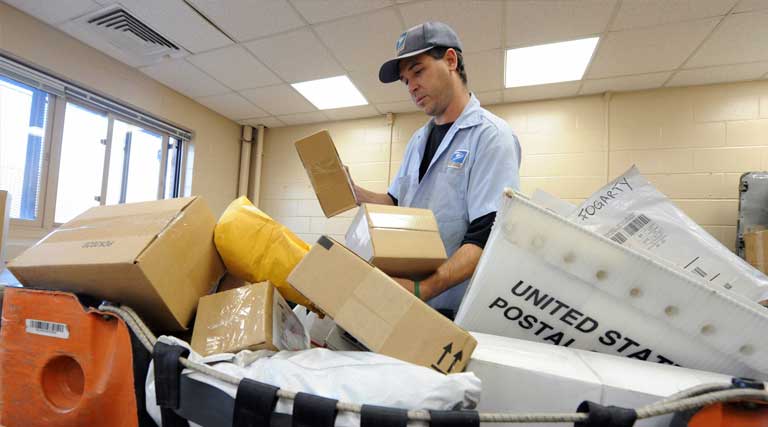Contractor Services Only Account For A Small Portion Of Overall Postal Deliveries. It’s Long Past Time To Expand These Fledgling Services.
The Center Square [By Ross Marchand]-
It’s just a few days before Christmas and millions of Americans are still waiting for their deliveries to arrive.
Washington Post contributor Abha Bhattarai notes, “Retailers and shippers are rushing to move an estimated 3 billion packages this holiday season, a nearly 30 percent jump from last year.”
More than 2 million packages are falling behind schedule every day, with some packages arriving a week late. The beleaguered United States Postal Service (USPS) is struggling to deliver reliable service, but this is difficult given historic volumes and 14,000 sidelined employees.
Fortunately, the USPS has a system in place to hand off mail to private shippers who are currently delivering faster than the agency can. With some help from the private sector, the USPS can take the heat off Santa this Christmas.
Across the country, post offices are so backed up with packages that employees are having a tough time keeping track of them and scanning them into the system.
According to USPS workers interviewed by Indianapolis-based 13News, the system simply cannot work when postal facilities “are sending out eight semi-trucks of packages a night … [but] … are getting 16 trucks a night…” And as usual, the USPS has proven utterly incapable of communicating its problems with the public.
One Indiana postal employee notes, “All priority mail is now running one-to-two weeks behind, but the post office won’t admit that. They won’t tell anybody anything.”
This problem is exacerbated by the USPS’ traditional position as the last-mile deliverer of mail and packages. Even private shippers such as UPS, FedEx, and Amazon have relied on America’s mail carrier to get packages to consumers’ doorsteps (though that is changing). So, when there is a bottleneck in USPS deliveries, consumers often pay the price regardless of who originally shipped out their package.
Fortunately, the USPS does have a program in place to contract out last-mile deliveries to private individuals and shippers.
The agency sometimes uses its Contract Delivery Service (CDS) to compensate private parties to get mail from Point A to Point B, helping the USPS fulfill its universal service obligation. But these contractor services only account for a small portion of overall postal deliveries.
CDS contractors deliver mail to about 3 million delivery points per year, compared to about 160 million delivery points overall across the country. These agreements with private companies and individual contractors cost the agency approximately $400 million annually, compared to more than $80 billion in total yearly USPS operating expenses.
It’s long past time to expand these fledgling services.
Currently, USPS’ private counterparts such as UPS and FedEx are outpacing the agency in delivery times. According to shipping data analytics firm ShipMatrix, “For December 6 thru 12, FedEx was at 93.9%, UPS at 96.1 percent, and USPS at 87.5% [for on-time delivery performance]. This means over 3.5 million parcels now are experiencing a delay of one or more days in coming days due to a decline in their performance compared to the period of Nov 22 thru Dec 5 when FedEx was at 94.9%, UPS at 96.3% and USPS at 92.8%.”
Part of this discrepancy is because private shippers have more flexibility in choosing their consumers. But, these private shippers also have greater hiring flexibility to offset any COVID-related staffing shortages and appear to offer better virus-related protections to its workers. Companies, after all, have far more of an incentive to keep their employees healthy and working than government agencies.
The USPS expanding their CDS program would mean being able to offload historically large package volume onto companies and contractors with a proven track-record. And, because the agency has about $14 billion in cash on hand, expanding its contractor compensation program is feasible.
The agency should, however, be vigilant about monitoring fraud in the program. A 2019 report by the Inspector General found, “that the Postal Service paid about $12.5 million above annual contract costs to CDS suppliers in fiscal year (FY) 2018.”
With increased monitoring over the program and expanded competition, the USPS should be able to deliver substantial cost savings while alleviating their shipping burden. It’s time to empty those trucks and fill Americans’ stockings.
Ross Marchand is a senior fellow for the Taxpayers Protection Alliance.




